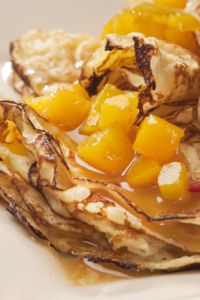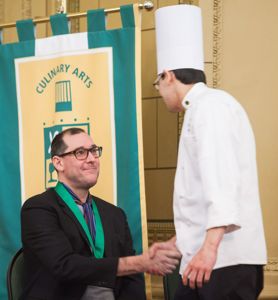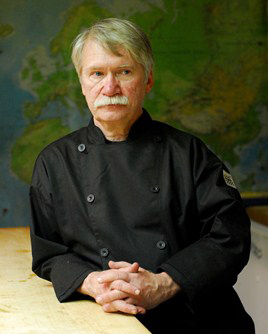FoodChannel.com Announces Top 10 Dessert Trends for 2014
Saturday, 01 March 2014 03:00
 Hand pies are the latest incarnation in the mini-dessert trend, crêpes add adventure to diners’ repertoires, and nuts, dessert butters and spoonables are big.
Hand pies are the latest incarnation in the mini-dessert trend, crêpes add adventure to diners’ repertoires, and nuts, dessert butters and spoonables are big.
The Food Channel® (foodchannel.com) in February released its “Top Ten Dessert Trends for 2014,”sponsored by Otis Spunkmeyer®. The popular annual report looks at market trends around sweets and treats. Based on research conducted in conjunction with CultureWaves®, the list identifies the significant behaviors of consumers, foodservice professionals and manufacturers, with original recipes and photographs to illustrate each trend.
The Food Channel Top 10 Dessert Trends for 2014 are:

 Mark Ladner, executive chef of Del Posto in New York, tells CIA grads to always be students and remain curious.
Mark Ladner, executive chef of Del Posto in New York, tells CIA grads to always be students and remain curious. In the culinary world, learning the “how” and its many variations is a critical part of students’ education. One way to teach curiosity is to capitalize on the five “W”s.
In the culinary world, learning the “how” and its many variations is a critical part of students’ education. One way to teach curiosity is to capitalize on the five “W”s. For starters, temperature and heat are not the same thing. When is convection mechanical, and when is it natural? And is food cooked by radiation harmful? Chef Weiner explains why all culinary students should understand the basic science behind critical processes in the kitchen.
For starters, temperature and heat are not the same thing. When is convection mechanical, and when is it natural? And is food cooked by radiation harmful? Chef Weiner explains why all culinary students should understand the basic science behind critical processes in the kitchen. Change is challenging, but necessary for growth. When striving to be the instrument of positive change, a successful, simple way to intercept every reason given for resistance is to utter the single word, “Why?”
Change is challenging, but necessary for growth. When striving to be the instrument of positive change, a successful, simple way to intercept every reason given for resistance is to utter the single word, “Why?”